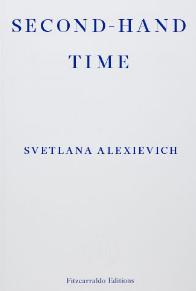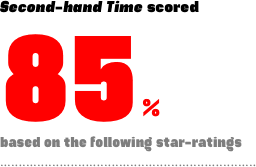 |
||||||||||||
 |
 |
|||||||||||
 |
 |
 |
 |
 |
 |
 |
||||||
 |
||||||||||||
 |
 |
 |
||||||||||
 |
||||||||||||





What was it about?
Is it history or not-quite history? Svetlana Alexievich was awarded the Nobel Prize for literature for her unique way of recording the past through meticulous interviews that build up a complex oral history of life in the USSR, her 'polyphonic writings'. Alexievich was born in the 1940s, and so knew well the generation who lived through the collapse of Soviet Russia. Her work as a journalist led her to this 'domestic history'. She's not interested in recording facts, instead she asks 'How did you live? What did you cook? How did you feel?' These are stories that would otherwise remain untold, voices that are not heard in the official history books, but have important things to say.
What did we think of it?
The book is a kalaidescope of voices, thoughts, feelings and stories. Alexievich has been interviewing people for twenty years and the interviews are grouped thematically, but not necessarily chronologically. The book doesn't really have a strong narrative arc but in general we found the voices and the individual stories compelling enough to draw us through this 700-page work.
We were surprised by the new perspective on events we remembered such as Yeltsin and the putsch. For the first time we were able to see from the point of view of people who lived all their lives under State control that told them what to do, how to work, how to think, and understood how utterly unprepared they were when 'democracy' arrived. It is also chilling the rich cultural tradition that is so quickly abandoned in favour of consumerism, much to the despair of the older people who lived difficult lives, but these were nonetheless lives that they felt, rightly or wrongly, had meaning and served a higher purpose.
There is a preoccupation with death that runs through this all the way and we wondered if this is something innate to Russian culture or something that stems from what they've been through as a people.
Would we recommend it?
What's special about this book is the way Alexievich allows her subjects to express themselves and the extraordinary truths that come from that. She's an author who has enormous empathy and respect for her fellow human beings, and allows them to tell their stories no matter what their ideological standpoint was, and trusts that the reader will gain knowledge, insight and understanding through the process. It's an extraordinary book and although the subject is a serious one the stories are incredibly readable. Recommended for any who want to better understand the world we live in.
![]()
![]()
I thought this book was very interesting showing how Russian/ Ex Soviet people lived and felt and what they believed in under soviet rule and what has happened since. The voices impressed and moved me, simple but extraordinarily eloquent, deep and emotional. I also developed a respect for Svetlana who shows such humanity and empathy. I appreciated some of the positives about socialism and it made me re-appraise my views of Russians and left me with a real sadness for what they have gone through.
![]()
![]()
Totally fascinating and it's great to get that sense of the emotions and the feelings of the people who lived through this – an interior view. I think the editing and the mix of voices is brilliant. But it is quite an intense read. Impressive, though.
![]()
![]()
I can't really detect a narrative arc, and that bothers me. I found reading this a very emotional experience. I felt buffeted between the hope and dejection, triumph and despair. But I think it's such a worthwhile book in helping us undertsand a system that many millions of people believed was a better way of life.
![]()
![]()
Incredibly compelling, and gave me insight and understanding into a country and people I didn't really have a correct impression of from reports in the media. As awful as their history is I saw many parallels with the West. A real achievement from an extraordinary writer.

March book club (2017) found us at Sally's house sitting down to a Russian feast of black rye bread with traditional toppings followed by chicken, beetroot salad and some kind of delicious garlicky sauce. No vampires bothered me that night, and we had plenty of excellent discussion of this fascinating book.
Also discussed: 10 Days that Shook the World by John Reed • FT article about a group that exists to prepare Russian people for the return of the Tsars • the NHS • Exit West, Mosin Hamid